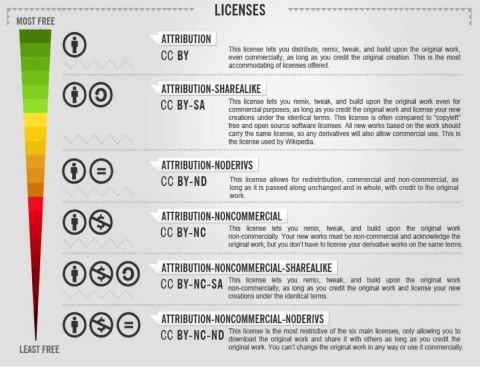Creative Commons: Diversifying Your Dissertation
While researching for UNHInnovation (UNHI), I stumbled upon an article about Creative Commons (CC) that sparked my interest. The article can be found here: http://creativecommons.org/tag/dissertation. In the article, Jane Park discusses how both Stanford and Berkeley University graduate students have been licensing their dissertations under Creative Commons. I think this is a novel idea and a new application for CC licenses, because it is a great way for graduate students to access a larger audience with their dissertation while retaining and controlling their copyrights.
When a dissertation is created at the University of New Hampshire (UNH), UNH retains a non-exclusive, royalty free license to reproduce the work with attribution. But while UNH retains a license, the dissertations themselves are intellectual property of the graduate students that created them. This means that when a UNH graduate student creates his/her dissertation, he/she is entitled to all the rights that are reserved to a copyright holder for their work. Some of these rights include: the right to reproduce, to distribute, or to create derivate works. Creative Commons licenses were created to allow copyright holders to modify copyright terms to suit their needs. While they are a set of rights granted to copyright holders, CC licenses allow them to relinquish some of these rights. With a CC license, the licensed work can be thought of as having “some rights reserved” instead of “all rights reserved.” The types of rights given away by the copyright holder depend on the license they chose. There are six different kinds of licenses, some less restrictive and others more restrictive with how the work can be used. An infographic on Creative Commons licenses and their uses can be found below.
The two students mentioned in Park’s article, Danah Boyd and Joseph Hall, licensed their work under a CC BY-NC-ND license. That means that their dissertations are free to copy and redistribute in any medium, provided that they are attributed to the work, no derivatives are made from the work, and the work is not used commercially. This type of license allows the students to potentially gain greater publicity for their dissertations while at the same time retaining control of its use. This is an important benefit of Creative Commons. Most dissertations are created and do not receive much exposure because they are not given a wide circulation due to cost or accessibility. By having their work free to reproduce, students have a greater chance of generating interest from their thesis and a greater chance of collaboration with those who appreciate their work. Additionally, the access to free academic information can be seen as a public benefit in itself.
Creative Commons licensing may also have advantages over ProQuest licenses, which at UNH is the common way of publishing dissertations. ProQuest is a service which archives and disseminates dissertations based on a non-exclusive license. This license allows them to not only host dissertations, but also to sell them while collecting royalty fees for the authors. Most dissertations are archived for free, but there are additional fees for some services. For example, there is an additional service for Open Access Publishing, which allows for standard search engines such as Google to display the work.
Creative Commons licenses provide some of the benefits of a ProQuest license without the additional cost, because they are inherently open access. In addition, CC licenses may provide benefits that cannot be given with ProQuest. A CC license may allow others not only to share the work, but also improve it while still giving attribution to its creator. But there are some detriments to CC licensing. Because the works are free to distribute, graduate students are not as likely to sell their dissertations as they would from ProQuest licensing. But while this may diminish the ability for graduate students to sell their work, it is in exchange for greater publicity and greater control of the terms of its license.
Danah Boyd, one of the students from the article, wrote on her blog (which can be found at http://www.zephoria.org/thoughts/archives/2009/02/18/licensing_your.html),
“What’s the advantage of keeping ‘all rights reserved?’ Why not let folks use it for whatever non-commercial purposes they deem fit (like teaching a chapter or two in class)? I mean… I would LOVE it if someone translated my dissertation. Or remixed it. Or turned it into a movie. That ain’t ever gonna happen, but still… why actively prevent it? And while we’re at it… why not make it freely available?"
With these benefits in mind and this mindset at heart, I would suggest that more students consider place their dissertations under a Creative Commons license. They provide greater exposure for the work students have created while at the same time allowing them greater control of its use. Best of all, it’s free to use.
For those interested in viewing some of the students’ dissertations, Danah Boyd and her fellow graduate Joseph’s dissertations can be found in the following links: Danah Boyd: Taken Out of Context, and Joseph Hall: Policy Mechanisms for Increasing Transparency in Electronic Voting.
Mike Leriche,
Licensing Assistant

Image is a portion of Creative Commons: Free Photos for Bloggers by foter.com. Image is licensed under CC-BY-SA.